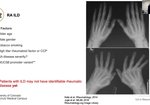Are your patients with moderate to severe Rheumatoid Arthritis (RA) getting the appropriate dose?
INDICATION
ACTEMRA (tocilizumab) is indicated for the treatment of adult patients with moderately to severely active rheumatoid arthritis (RA) who have had an inadequate response to one or more Disease-Modifying Anti-Rheumatic Drugs (DMARDs).
BOXED WARNING and Additional Important Safety Information
RISK OF SERIOUS INFECTIONS:
Patients treated with ACTEMRA are at increased risk for developing serious infections that may lead to hospitalization or death, including tuberculosis (TB), bacterial, invasive fungal, viral, or other opportunistic infections. If a serious infection develops, interrupt ACTEMRA until the infection is controlled.
Reported infections include:
- Active tuberculosis, which may present with pulmonary or extrapulmonary disease. Patients should be tested for latent tuberculosis before ACTEMRA use and during therapy. Treatment for latent infection should be initiated prior to ACTEMRA use.
- Invasive fungal infections, including candidiasis, aspergillosis, and pneumocystis. Patients with invasive fungal infections may present with disseminated, rather than localized, disease.
- Bacterial, viral and other infections due to opportunistic pathogens.
The risks and benefits of treatment with ACTEMRA should be carefully considered prior to initiating therapy in patients with chronic or recurrent infection.
Patients should be closely monitored for the development of signs and symptoms of infection during and after treatment with ACTEMRA, including the possible development of tuberculosis in patients who tested negative for latent tuberculosis infection prior to initiating therapy.
ACTEMRA is contraindicated in patients with known hypersensitivity to ACTEMRA.
Other serious or potentially life-threatening adverse reactions that have been reported in clinical trials with ACTEMRA include gastrointestinal perforations. Use ACTEMRA with caution in patients who may be at risk for GI perforations.
Monitor patients for signs and symptoms of hepatic injury. Modify or discontinue ACTEMRA if abnormal liver tests persist or worsen or if clinical signs and symptoms of liver disease develop.
Laboratory monitoring is recommended due to potential consequences of treatment-related laboratory abnormalities in neutrophils, platelets, lipids, and liver function tests.
Hypersensitivity reactions, including anaphylaxis, death and serious cutaneous reactions including Drug Reaction with Eosinophilia and Systemic Symptoms (DRESS) have occurred.
- If a hypersensitivity reaction occurs, discontinue ACTEMRA, treat promptly, and monitor until reaction resolves
Avoid use of live vaccines concurrently with ACTEMRA, as clinical safety has not been established.
Other potential risks of ACTEMRA include demyelinating disorders and malignancies.
Treatment with ACTEMRA is not recommended in patients with active hepatic disease or hepatic impairment.
Most common adverse reactions (≥ 5%) include upper respiratory tract infections, nasopharyngitis, headache, hypertension, increased ALT, injection site reactions (SC only).
You may report side effects to the FDA at (800) FDA-1088 or www.fda.gov/medwatch. You may also report side effects to Genentech at (888) 835-2555.
Please see additional Important Safety Information in accompanying full Prescribing Information, including BOXED WARNING.
ACTEMRA and ACTPen are registered trademarks of Chugai Seiyaku Kabushiki Kaisha Corp., a member of the Roche Group. © 2024 Genentech USA, Inc. All rights reserved. M-US-00024872(v1.0) 09/24




















